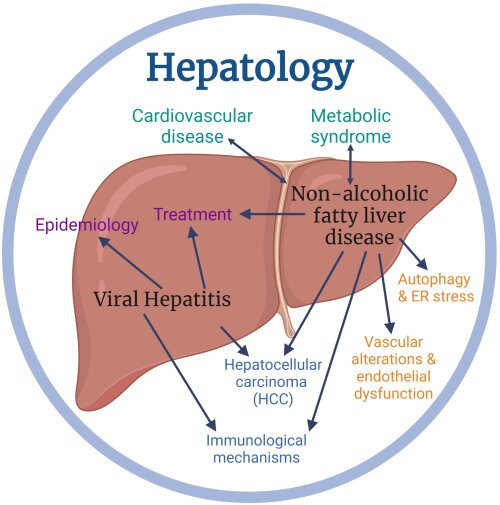
Steatosis and portal hypertension – role of autophagy and ER stress
Non-alcoholic fatty liver disease (NAFLD) is increasingly recognized as an important source of liver-related morbidity and mortality, taking epidemic proportions because of its intimate link with the metabolic syndrome and its features. Steatosis can be accompanied by signs of inflammation and hepatocellular damage, leading to non-alcoholic steatohepatitis (NASH).
In a rat model of steatosis and steatohepatitis, we previously demonstrated that a methionine–choline-deficient (MCD) diet rapidly induces steatosis and at a later stage also signs of inflammation and oxidative stress. In this rat model of severe NAFLD, we study the mechanisms of portal hypertension in relation to the severity of steatosis. Our research focuses on the mechanisms of intrahepatic resistance and its determinants in experimental NAFLD and the underlying immunological changes of the innate and adaptive immune system. More recently we also started to study the role of autophagy and ER stress in this mechanisms as autophagy plays a major role in the lipid metabolism and lipid accumulation.
Hepatitis B infections
Our research focuses on providing insights into the immuno-pathogenesis of chronic HBV infections that are fundamental in the quest for novel treatment approaches aimed at a functional cure. While much is known about the ineffective HBV-specific T-cell responses that characterise persistent HBV replication, B cells have been left largely understudied. Abetter understanding of the role of the humoral immune response in chronic HBV, at the level of HBV-specific antibody production and of the phenotypic and functional level of B cells is one of the key strategies warranting exploration. The recent development of fluorescently labelled HBV proteins has fuelled novel research into the mechanisms behind dysfunctional HBsAg-specific and fluctuating, possibly pathogenic, HBcAg-specific B-cell responses in chronic HBV. Also novel immunomodulatory treatments that partly target B cells are currently in clinical development, but a detailed assessment of their impact on HBV-specific B-cell responses is lacking. Till today, antiviral treatment with potent third-generation nucleos(t)ide analogues (NUCs) rarely achieve the most important HBV treatment goal, which is hepatitis B surface antigen (HBsAg) loss and anti-HBs seroconversion, the so-called functional cure, the only current endpoint allowing for treatment discontinuation. This therefore drives urgency in both clinical and experimental research in the field of HBV treatment devoted to identifying new therapeutics strategies. For this reason, we currently deploy discontinuation of antiviral therapy as a strategy to cure Hepatitis. How treatment discontinuetion in some patients activates an effective immune response is not clear and how such an effect can be predicted even before or early after the treatment is stopped is one of our major goals. Lastly, we invest in standardising immunological assays and our data from functional humoral studies as well as discontinuation of virus/immune-targeting drugs will help to guide immunological biomarker discovery, understand mechanisms of action, guide logical combination strategies, guide clinical management and provide novel treatment options.
Projects Hepatology
prof dr Sven Francque, prof dr Thomas Vanwolleghem, dr Tom Adomati
PhD Cédric Peleman
Role and modulation of hepatic hypoxia in nonalcoholic steatohepatitis.
PhD Jonathan Mertens
The triad between non-alcoholic fatty liver disease, insulin resistance and type 1 diabetes mellitus and its association with cardiovascular and renal complications
PhD Shivani Chotkoe
The role and reversibility of vascular alterations in the development, progression and regression of nonalcoholic fatty liver disease (NAFLD)
PhD Arno Furquim d'Almeida
PhD Zouhir Gadi
Role of vascular alterations in the reversibility and in the impact of fluctuating metabolic pressure on the development and progression of Metabolic Dysfunction-Associated Steatotic Liver Disease (MASLD).
PhD Lotte Schoenmakers
The role of vascular alterations in early stages of metabolic dysfunction-associated steatotic liver disease (MASLD) and the impact on disease progression